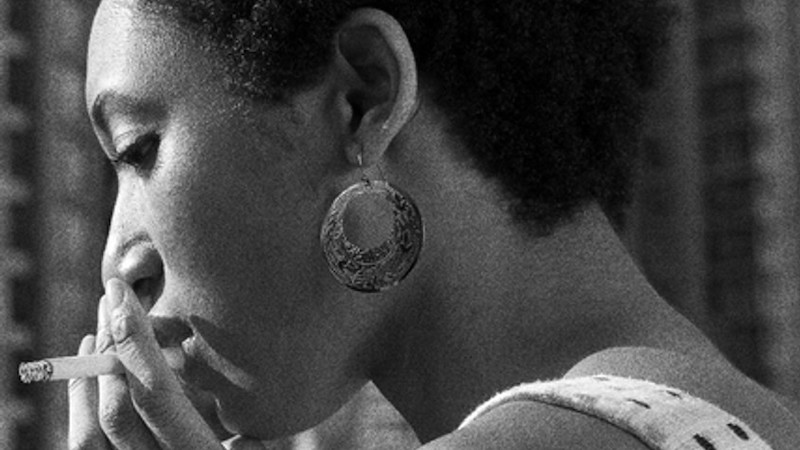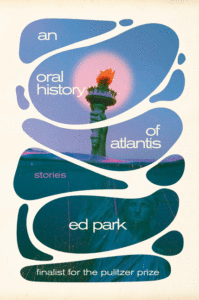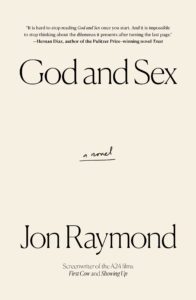
Our bounty of brilliant reviews this week Lydia Millet on Ed Park’s An Oral History of Atlantis, Lauren Michele Jackson on Jeremy Atherton Lin’s Deep House, Ron Charles on Jon Raymond’s God and Sex, Lauren Christensen on Stephanie Wambugu’s Lonely Crowds, and Piper French on Sam Bloch’s Shade.

“Like Same Bed Different Dreams, it is a pastiche of forms and nods to genre fiction, from commentaries on campy sci-fi movies to middle-aged dissections of long-gone relationships to indignant epistolary rebukes. The tales often adopt a knowing, nerd-chic irony. Characters with names like Bethany Blanket and Vernon Bodily are rendered in prose full of writerly self-deprecation and mock hipsterdom.
…
“Occasionally a story or passage has a haunting, existential quality reminiscent of Italo Calvino or Kathryn Davis, as if we’re hovering over an amorphous landscape with signposts written in runes. The title story, for instance, is set in an alternate New York City where all the bridges connecting it to the mainland have been blown up to guard against a virus called Metaphor (MtPR). A lonely, erudite man obsessed with his diminutive stature follows a writer through wintery streets, then abandons the pursuit to enter, via pictures in an antique viewing booth, a world of whales. Outside, the fictional New York is a lost kingdom, becoming detached from its real geography and turning fluid—an island whose identity, possibly, has already been subsumed into myth.
…
“Compared with Park’s novels, the collection feels untethered—a natural condition for texts gathered across decades and bound in a single volume. Where novels are purpose-built structures shored up with vectors of plot and suspense, collections like this one offer an experience more akin to strolling through a writer’s mind over time. What these stories have in common is their playful, arty milieu and a sense of encodedness. Language and culture are ciphers that can never be fully broken; the slippery elusiveness of their multiple meanings is meaning enough.”
–Lydia Millet on Ed Park’s An Oral History of Atlantis (The New York Times Book Review)
“The wish for precedented times is a wish for a present made intelligible, tamed with language, a moment we need not flail to meet. The author Jeremy Atherton Lin gets at the feeling, capturing what it is like to think yourself idiosyncratic and new within the most precedented of times. His first book, Gay Bar, crosshatched his own experience of night life in the nineties, as a mixed-race kid with softly conservative ideas about sex, with a historical study of the gay bar as an idea and an endangered artifact. His new book, Deep House, published in June, provides the sublime narrative edifice for, as the subtitle declares, The Gayest Love Story Ever Told. That superlative reads like a provocation. (‘i’ll be the judge of that,’ a user on Goodreads has remarked.) What follows, though, is tenderly accumulative, a tale of love and immigration made precarious by the legal apparatuses that ‘validate interpersonal relationships, govern sexual identity and decree citizenship,’ heavy with the ghosts of other, past lovers turned into court cases. Atherton Lin’s method, embedding memoir with cultural history, discloses how fickle and self-interested institutional memory can be. Who’s to say what machinations and which lives from the past will be codified as meaningful precedent, what ordinary triumph or injustice? Much will be overlooked, but much can be reclaimed. What is deemed of consequence takes shape not in medias res but in the belated, and vital, act of interpretation.
…
“This frotting between the personal and the historical has made Atherton Lin one of those contemporary writers from whom the literary market begs for a clever category like ‘cultural memoir.’ There are plenty of bad and undercooked versions of this, but Atherton Lin traverses both territories with intelligence and finesse.
…
“Such stories, running the gamut from calamity to farce, abound in Deep House. Atherton Lin narrates them with an informed curiosity, paying much due reverence to the community of scholars and archivists who unearth and query histories that have been paved over with corporate affirmation, as well as theorists and artists whose means of imbricating the personal, historical, and political have made room for his own. As a critic and a historian, Atherton Lin faithfully retrieves the Clinton-era discourse over doma that his younger self wasn’t clocking; as a memoirist, though, he expresses fidelity to the interiority of himself and Famous as boyfriends with hotter and, frankly, more interesting things to do than seek representation within the Beltway.”
–Lauren Michele Jackson on Jeremy Atherton Lin’s Deep House (The New Yorker)

“Miracles are a tough challenge for modern theology—the happy twin to the problem of evil. As the subject of political bromides, angel-touched TV shows and life-after-death bestsellers, divine intervention hovers outside the world of rational thought and scientific investigation. Miracles are even less likely to break through into the realm of literary fiction.
That’s what makes Jon Raymond’s new novel, God and Sex, so fascinating—and so unsettling. Without a hint of religious posturing or angelic wing-flapping, Raymond asks, Could you really stand to have your prayers answered?
…
“In the midst of a terrifying crisis — which demonstrates what fiery action Raymond can create when he wants to — Arthur asks God for a miracle. And God grants it. I can’t emphasize enough how odd this is. I would be less surprised to hear a burning bush talk than to find a miracle interrupting a literary novel. And what makes it particularly wondrous is how steady Raymond holds his hand. Nothing about God and Sex grows gauzy or mystical. But Arthur, with his makeshift theology cobbled together from bits of Christianity, pseudoscience and New Age platitudes, must suddenly deal with the repercussions of what he believes he was granted.
…
“In Raymond’s thoughtful handling, this makes for a fascinating, rare examination of a rational mind confronting the limits of rationality. He captures Arthur in the crosscurrents of doubt and belief, snagged on moments of lucidity and wit. How elastic is our faith, the novel wonders, how interwoven is it with vanity and superstition? Tangled in the dilemma of getting what he prayed for, Arthur must now take seriously the implacable bargain he made with God, along with the terror of living with the possibility of such fickle interventions in a world ablaze with suffering.”
–Ron Charles on Jon Raymond’s God and Sex (The Washington Post)
“If Vivian Gornick wrote fiction, it might look something like Lonely Crowds: a middle-aged academic’s cool, confessional recounting of her earlier life, her imperfect parentage and feminist awakening and urban detachment.
…
“There is nothing groundbreaking or experimental about this novel’s conceit; it’s about as classic a coming-of-age as you’ll find. But as Ruth grows up and into an independent perspective whose outlines can finally be distinguished from those of the people she grew up with, it’s the specificity of this young woman’s mind, the contours with which she draws the characters and environments around her, that make Lonely Crowds exceptional.
And of these surroundings there is one whose gravitational pull overpowers all the others. Like Jane Harden’s, Maria’s influence on her subject blurs the lines between sister, friend, lover, muse; it also increases in direct proportion to the effort it requires. Maria summons Ruth when it suits her—to accompany her to meet her deadbeat dad, for instance, or to attend her gallery openings—but disappears without contact for days or months at a time. She disparages Ruth’s jobs and boyfriends and initiates sex with her only to return again and again to her wealthy, white girlfriend.
As hopeless as Ruth might seem in the face of her infatuation, Wambugu shows that the state of devotion can be more about the giver than the receiver.”
–Lauren Christensen on Stephanie Wambugu’s Lonely Crowds (The New York Times)
“Bloch believes that shade has been underappreciated, too often neglected in discussions of urban policy, inequality, architecture, design, and the environment. Shade is his corrective: a roving, inveterately curious account that argues convincingly for his subject’s centrality to community health, climate adaptation, and even a more robust and inclusive public sphere.
…
“While the scope of the original piece stays narrowly trained on L.A., here Bloch zooms out to offer a kaleidoscopic look at shade’s past, present, and future. The book begins by a stream in Oregon’s backcountry, travels from bygone civilizations’ approach to the shadows through the history of twentieth-century American planning and design, explores the nexus of climate and inequality present in farmworker heat deaths and extreme weather events, and ends on dubious schemes to create shade on a planetary scale by injecting aerosols into the atmosphere.
…
“As Bloch explains it, there are two big trends here that would come to define postwar America: a retreat from the commons, and an embrace of manufactured, resource-intensive comfort at any cost. America on AC is an America suspicious of strangers and the outdoors, intolerant of discomfort, addicted to the lonely monotony of suburbia, and willing to sacrifice a great deal to avoid addressing these pathologies—more nightmare than dream.
…
“In many ways, Shade reads as an homage to ‘The Case for Letting Malibu Burn,’ [Mike] Davis’s classic essay on L.A.’s disparate response to two types of blazes: the infernos that engulf neglected tenements in Westlake and the inevitable wildfires that threaten its moneyed canyons. Amusingly, each writer’s choice of focus is reflected in their style. As with Henry Miller, Davis’s tone is often one of holy zeal; his argument in ‘Letting Malibu Burn’ is incendiary in more ways than one. Bloch, meanwhile, stays cool: measured, given to reconsideration, fond of constructions hedged with ‘perhaps’ and ‘maybe.’ He clearly feels strongly about the inequality he portrays, but his tone is so evenhanded that it can belie the urgency that would seem to follow from his diagnoses.”
–Piper French on Sam Bloch’s Shade: The Promise of a Forgotten Natural Resource (The New Republic)
If you buy books linked on our site, Lit Hub may earn a commission from Bookshop.org, whose fees support independent bookstores.

